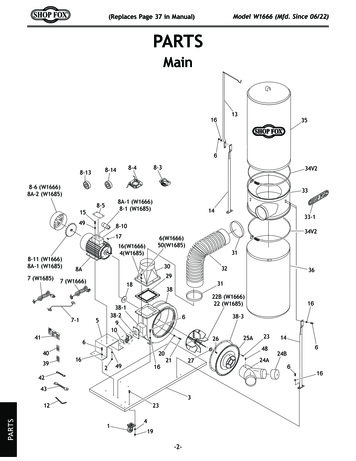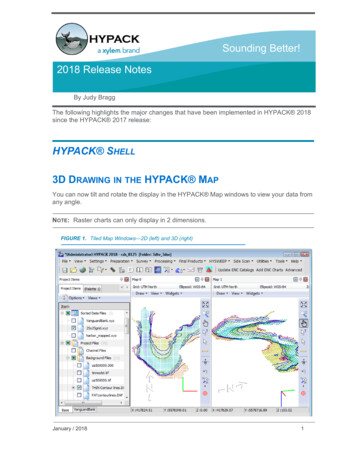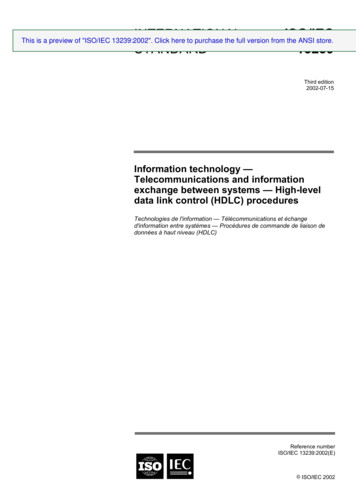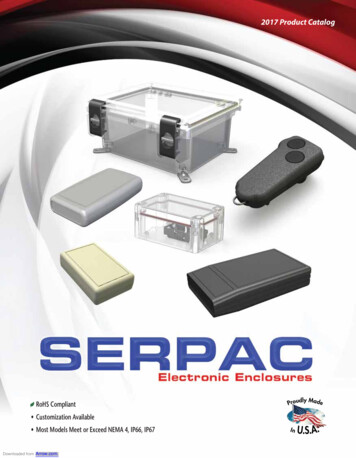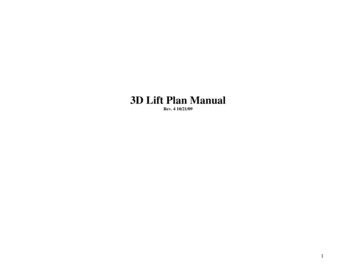![[This Page Replaces Page 1] 20 15 - Bon Secours Memorial College Of Nursing](/img/29/2015-2016-20addendum-20i-20college-20catalog.jpg)
Transcription
[This page replaces page 1]college catalogmdu 5en 5.1dd .1A 12201516
[This page replaces page 2]welcomeWelcome to Bon Secours Memorial College of Nursing. We are delighted you chose our College to pursue youreducation. Our nursing programs exceed expectations, as shown by our unsurpassed NCLEX-RN exam pass rates, aproud distinction of excellence. As a BSMCON nursing student, you will be immersed in coursework, simulation labsand clinical experiences while building leadership, supporting community and developing personal and professionalrelationships that will undoubtedly last beyond your time with us.We are here to guide you through this journey. Our experienced faculty and dedicated staff will help celebrate yourvictories and support any challenges. As you progress through the program, the information provided in this CollegeCatalog will be indispensable. Please read and use this document as a reference. When guidelines/policies are addedor modified, an update will appear on www.BSMCON.edu under Policies. Please seek clarification if you have questions.Best wishes for a successful and memorable year ahead!Sincerely,Melanie H. Green, PhD, RNVice President and Provostcollege administration/staffBon Secours Memorial College of Nursing(the College) is a division of Bon SecoursMemorial Regional Medical Center of the BonSecours Virginia Health System. The Collegereports to the Bon Secours Richmond JointHospitals Board of Directors, which is thegoverning authority for the College. TheBoard has designated that the College VicePresident and Provost reports directly tothe CEO of Bon Secours Richmond as theexecutive officer for the College.The College is an equal opportunityeducation institution. The College does notdiscriminate based on race, color, religion,age, marital status, national origin, gender,sexual orientation, military veteran statusor disability in the administration of itseducational policies, admissions policies,scholarship and loan programs, or otherCollege administered programs.The contents of the College Catalog(Catalog) do not create a contract, nor dothey constitute a guarantee of continuedenrollment at the College. The Collegereserves the right to modify, amend, ordelete statements and to make changes tothe Catalog, curriculum, calendar, financialaid, and College policies as deemednecessary. Policy changes are communicatedvia the College’s website, www.BSMCON.edu. Each student is expected to abide bythe information contained in the Catalog.Failure to read the Catalog will not excusethe student from accountability.Effective 2015–2016 academic year.2 BON SECOURS MEMORIAL COLLEGE OF NURSINGMelanie Green, PhDProvost, Vice PresidentBarbara Sorbello, PhDDean of NursingRegina Welch, EdDDean of Finance and AdministrationLeslie Winston, MEdDean of Student ServicesChris-Tenna Perkins, PhDAssociate Dean of NursingKathy Buckley, MEdCoordinator of Continuing EducationMarlene CicchettoFinancial Aid SpecialistBenjamin Djeukeng, PhDDirector of Institutional EffectivenessRandy FaulkBuilding CoordinatorCrystal Filer-Ogden, MBADirector of Financial AidPeggy GaultAdministrative Assistantand Clerical SupervisorKathleen Hierholzer, MSLSLibrarianLinda Jackson, AAAdministrative SecretaryDia Lisner, BARegistrarTracy McCannAdministrative SecretaryCarrie Newcomb, MEdDirector of AdmissionsAllison Peterson, BACareer CounselorHolly Pugh, MSHADirector of Clinical SimulationAshley Racine, MEdDirector of Student SuccessPatricia RobersonAdministrative SecretaryBecky Roberts, MHAHealth and WellnessProgram CoordinatorShawn Ruppert, BARegistrar SpecialistAllan Sackenreuter, BASimulation TechnicianIngrid Terrell, BAMarketing AssistantMaria VasquezAdmissions and Recruitment SpecialistCarol Woychak, BSAdmissions Assistant
[This page replaces page 5]history of the collegeThe College’s rich history dates back to the formation of Richmond Memorial Hospital in 1957. The hospital was built tomemorialize the Richmond community’s World War II victims and to provide a general hospital that served people ofall races and backgrounds, regardless of their ability to pay. Richmond Memorial Hospital’s School of Nursing openedin 1961 to serve as a source of nurses for the hospital and to raise the level of health care in the community. In 1993, areplacement hospital for Richmond Memorial was planned in collaboration with Bon Secours. The new hospital, BonSecours Memorial Regional Medical Center, opened in 1998. The school was renamed the Bon Secours Memorial Schoolof Nursing.The College graduated the last diploma class in May 2012. During its 51 years of operation, the diploma program producedmore than 2,000 registered nurses who have delivered exceptional health care to their patients as a result of the excellenteducational foundation they received. In response to the need to prepare registered nurses at the baccalaureate level ofeducation, the school officially changed its status to a baccalaureate degree-granting college in 2010.Firmly rooted in this tradition of excellence, the College offers a Bachelor of Science in Nursing (BSN) program withboth pre-licensure and post-licensure (RN-BSN) tracks. The BSN program includes the essential curricular contentrecommended by the American Association of Colleges of Nursing. The College is dedicated to facilitating a view andpractice of health care as a ministry that anticipates the need to adapt to the ever-changing and demanding health careenvironment in order for our graduates to provide the highest quality care.Bon Secours Health System is a Catholic, not-for-profit, community-based health care system whose mission is toprovide “good help to those in need”. The Sisters of Bon Secours (French for “good help”), an international religiouscongregation devoted to the care of the poor and sick, was founded in Paris, France in 1824. In the United States, thecongregation’s health care ministries, which are operated by the Bon Secours Health System, Inc., include acute carehospitals, long-term care facilities, clinics, physicians’ practices, home health care services, and hospices.bon secours memorial college of nursingmissionAdvancing the Bon Secours tradition of good help to those in need The mission of Bon Secours Memorial College of Nursing is to deliver a holistic student-centered learning experiencethrough innovative health care career education programs designed to develop health care professionals who provideoutstanding care to the community.visionWe will be the College of choice for individuals called to serve in the health care professions.valuesAs a higher education institution, we commit that our mission, vision, and strategic direction are framed within thesevalue statements:Compassion—intentional engagement in reflective caring practices that embody an institutional culture of respect, integrityand generosityExcellence—integration of quality practices to promote ethical, spiritual, intellectual and professional growthGrowth—commitment to personal and institutional effectiveness to foster a spirit of inquiry, stewardship and sustainability2015–2016 COLLEGE CATALOG ADDENDUM 3
[This page replaces page 35]tuition, fees andterms of paymentBelow is a breakdown of estimated costs for the 2015-2016academic year. The per credit cost of the general educationclasses are provided for Reynolds Community College (in-state)where many of our students complete those requirements.The student bill is due in total on the established due dates; thereare no installment payment plans. The Nursing credit hour costsare the same for in-state and out-of-state students. The Collegereserves the right to make changes in tuition, fees, and othercosts without notice. The College communicates its tuition andfee schedule to all students annually. Students enrolled in generaleducation credits at local institutions are responsible for acquiringtuition and fee schedules directly from those institutions.2015–2016 Reynolds CC tuitionGENERAL EDUCATION COURSE TUITION RATES 155.10In-State Resident (per credit hour) 349.70 Out-of-State Resident (per credit hour)2015–2016 BSMCON tuition & feesBSN TRACK 367.50Nursing Tuition (per credit) 80.85Educational Services Fee (per nursing credit)RN-BSN TRACK 472.50 Nursing Tuition (per credit) 80.85Educational Services Fee (per credit)BSMCON GENERAL EDUCATION COURSES 250per credit hour (no fees)fees There is a Program Application Fee, which isnon-refundable. All students are required to pay the Educational Servicesfee, which helps defray the costs that include thefollowing: ATI Testing, Student Government Organization,Laura Murphy Discretionary fund (emergency relief),Library (access to databases for student research),computer use in the library and lab, student printing costs,Haiti Mission fund, Reach Student Assistance Program(personal counseling and support), graduation services,Career Placement Services, Clinical Liability Insurance.additional costs Allow for cost of books, supplies, annual backgroundchecks, CPR certifications, NCLEX licensureexamination, and other expenses Uniform, shoes, lab coat, stethoscope and watch withsecond hand are required Transportation and parking fees are the student’sresponsibility Returned check charges may vary depending onbank-assessed fee Transcripts 5 eachpayment termsPayment of tuition and fees are due before the firstday of each semester. Registration is not confirmed orguaranteed until the student’s account is paid in full; nonpayment will result in dropped classes and/or registrationholds, and/or resignation from the College.Students must report to the Registrar and follow Collegeprocedures when enrolling for general educationclasses at Reynolds’s Community College (RCC) or anyother approved institution. RCC tuition is posted to thestudent’s BSMCON account.Students retaking a class or who are in grade appeal and havestarted another class are responsible for the tuition and fees.receivables process fortuition paymentEach semester, the Bursar’s Office sends an email tostudents as a reminder of the tuition due date. After thesemester starts, the Bursar’s Office sends a second emailto students with an outstanding balance and attempts tocontact those students by phone. The Dean of Financeand Administration is notified of all students who have anoutstanding balance with a comment field that explainscircumstances such as third-party bill, Veterans Affairs, etc.If students do not respond to the second email, theBursar’s Office will put a hold on the student(s) accountand sends another email. Students are emailed through SONISWeb, which has anemail audit track.discounts During the course of the semester or year, students mayincur additional fees, fines or assessments that must bepaid in full at the time they are billed. Tuition: Students who are Bon Secours employeesor an immediate family member of a Bon Secoursemployee are eligible to receive 20 percent tuitioncredit only for nursing courses. The Dean of Finance and Administration makes the finaldecision about which student accounts will be sent to thecollection agency.4 BON SECOURS MEMORIAL COLLEGE OF NURSING
[This page replaces page 50]course prerequisites andcorequisitesgeneral education courses(offered by BSMCON)Nursing and selected non-nursing courses have prerequisitesthat must be successfully completed prior to enrollment inthese courses. Upon registration, prerequisite and corequisitecourses must be fulfilled or a plan approved to completeall prerequisites. Prerequisite or corequisite equivalenciesmay be approved by the Bon Secours Memorial Collegeof Nursing. Any change in course sequence is on anindividualized basis and subject to administrative approval.BSMCON offers some of the general education coursesrequired for the Bachelor of Science in Nursing. Studentsmay take required general education courses at institutionsaccredited by agencies recognized by the United StatesDepartment of Education. The College has a Course AffiliationAgreement with Reynolds Community College (RCC). TheAgreement facilitates an administrative relationship betweenthe two institutions that streamlines course enrollment, tuitionpayment, financial aid processing, and grade report release forstudents enrolled at both institutions. BSMCON students arenot required to take general education courses at RCC.Definitions: Prerequisite course: a course that is required prior totaking another course Corequisite course: a required course that must be taken incombination with another course or may be taken prior tothe noted course(s). In no circumstances may a corequisitecourse be taken after the noted course(s) Service learning: a structured educational experience thatintegrates community partnerships, reciprocal service,theory, and student reflection in order to teach civicengagement, enrich the nursing curriculum and strengthencommunities.Pre-licensure General EducationCourse RequirementsCOURSE PREFIXCOURSE TITLEART EEEArt elective3BIO 101Biology I4BIO 102Biology II4BIO 205Microbiology4DIT 121Nutrition3ENG 111English Composition I3ENG 112English Composition II3LIT EEELiterature elective3MTH 240/2001Statistics3BIO 141Human Anatomy & Physiology I4BIO 142Human Anatomy & Physiology II4PHI 200/2001Ethics3PSY 200Psychology3PSY 230Developmental Psychology3REL EEE/2001Religion elective3SOC 200Sociology3COM EEECommunication elective3Total General Education CreditsCREDITS56HNU 2001 Nutrition for the Health Sciences (3 credits:lecture)This course will explore fundamental nutrition concepts fornursing students and basic principles of nutrition to supporthealth across the life cycle. Course will review the applicationand utilization of available tools and resources and willhighlight current diet trends. It will include an introduction tonutrition assessment as well as medical nutrition therapy forprevalent disease states.MAT 2001 Introduction to Statistics (3 credits: lecture)This course focuses on understanding, interpreting, andapplying basic descriptive and inferential statistics within thecontext of nursing research and evidence-based practice.PHI 2001 Ethics: Practice, Theory, History (3 credits:lecture)This course serves as a general introduction to moralphilosophy in Western civilizations. The course begins byorienting students to the current state of ethical thinkingin an effort to locate themselves and others engaged inethical dialogue. The course explores virtue, principle, andconsequence based moral philosophies and finishes withcontemporary discussions in moral theory and ethicalpractice. The study of ethics produces a set of skills that areuseful for reflecting upon one’s own life, as well as the ethicalchoices facing oneself and others. At the end of the course,students will have the skills to raise ethical issues in practicalsettings and to help guide and engage in ethical deliberation.Through case studies and debate, students will learn andpractice methodologies for guiding ethical decision makingand consensus building within groups from differing ethicalbackgrounds and value systems.PHI 2101 Ethics and the Practicing Nurse (2 credits: lecture)This course provides nurses who have prior clinical experiencewith a rigorous methodology to analyze and discuss clinicalcases in the context of ethical principles. This course servesas a practical introduction to nursing ethics with an emphasison team communication and journal publication. Students willparticipate in readings and discussions with one another andthe instructors, and the coursework culminates in producing apublishable quality case report. Students will be supported in2015–2016 COLLEGE CATALOG ADDENDUM 5
[This page replaces page 51]their writing and will be expected to attempt publication. Thegoals of the course include developing students’ abilities tocommunicate and evaluate ethical reasoning effectively andto identify values implicit in clinical decision making.REL 2001 World Religions:Living Faith Traditions (3 credits: lecture)An investigation of various Living Faith Traditions and theways they continue to affect our immediate U.S. culturalcontext. Special attention will be given to Hinduism,Buddhism, Judaism, Christianity, and Islam and how theirviews impact health care providers in their formative years.general education courses(Reynolds Community College)ART 100 Art Appreciation (3 credits: lecture)Introduces art from prehistoric times to the present day.Describes architectural styles, sculpture, photography,printmaking, and painting techniques. Prerequisite:Placement in ENG 111 or placement in corequisites ENG 111and ENF 3.ART 101 History and Appreciation of Art I (3 credits:lecture)Presents the history and interpretation of architecture,sculpture, and painting. Begins with prehistoric art andfollows the development of western civilization to thepresent. ART 101 and 102 may be taken out of order. PartI of II. Prerequisite: Placement in ENG 111 or placement incorequisites ENG 111 and ENF 3.ART 102 History and Appreciation of Art II (3 credits:lecture)Presents the history and interpretation of architecture,sculpture, and painting. Begins with prehistoric art andfollows the development of western civilization to thepresent. ART 101 and 102 may be taken out of order. PartII of II. Prerequisite: Placement in ENG 111 or placement incorequisites ENG 111 and ENF 3.BIO 101 General Biology I (4 credits: 3 credits lecture, 1credit lab)Focuses on foundations in cellular structure, metabolism,and genetics in an evolutionary context. Explores the coreconcepts of evolution; structure and function; informationflow, storage and exchange; pathways and transformationsof energy and matter; and systems biology. Emphasizesprocess of science, interdisciplinary approach, and relevanceof biology to society. Part I of a two-course sequence.Prerequisite: Completion of ENF 2, if required by placementtest, and completion of MTE 1-3. Lecture 3 hours. Recitationand Laboratory 3 hours.BIO 102 General Biology II (4 credits: 3 credits lecture, 1credit lab)Focuses on diversity of life, anatomy and physiology oforganisms, and ecosystem organization and processes in6 BON SECOURS MEMORIAL COLLEGE OF NURSINGan evolutionary context. Explores the core concepts ofevolution; structure and function; information flow, storageand exchange; pathways and transformations of energyand matter; and systems biology. Emphasizes process ofscience, interdisciplinary approach, and relevance of biologyto society. Part II of a two-course sequence. Prerequisite:Satisfactory completion of BIO 101. Lecture 3 hours.Recitation and Laboratory 3 hours.BIO 141 – Human Anatomy & Physiology I (4 credits: 3credits lecture, 1 credit lab)Integrates anatomy and physiology of cells, tissues, organs,and systems of the human body. Integrates concepts ofchemistry, physics, and pathology. Part I of II. Prerequisites:(1) High school biology and chemistry completed withinfive years of registering for this course with a grade of C orbetter or BIO 101 (or an equivalent) or advisor approval and(2) completion of ENF 2, if required by placement test orinstructor/ advisor approval.BIO 142 Human Anatomy and Physiology II (4 credits: 3credits lecture, 1 credit lab)Integrates anatomy and physiology of cells, tissues, organs,and systems of the human body. Integrates concepts ofchemistry, physics, and pathology. Part II of II. Prerequisite:BIO 141.BIO 205 General Microbiology (4 credits: 3 credits lecture, 1credit lab)Examines morphology, genetics, physiology, ecology, andcontrol of microorganisms. Emphasizes application ofmicrobiological techniques to selected fields. Prerequisites:BIO 101-102 and CHM 111-112 or equivalent, or permission ofthe School of Mathematics, Science, and Engineering. CHM101-102 are acceptable equivalent courses. Credits for CHM101-102 do not count toward the AS degree in Science.CST 100 Principles of Public Speaking (3 credits: lecture)Applies theory and principles of public address with emphasison preparation and delivery.CST 110 Introduction to Speech Communication (3credits: lecture) Examines the elements affecting speechcommunication at the individual, small group, and publiccommunication levels with emphasis on practice ofcommunication at each level.DIT 121 Nutrition I (3 credits: lecture)Studies food composition, dietary guidelines, and nutrientsessential to healthy human life. Analyzes nutrient functionand metabolism.ENG 111 College Composition I (3 credits: lecture)Introduces students to critical thinking and the fundamentalsof academic writing. Through the writing process, studentsrefine topics; develop and support ideas; investigate,evaluate, and incorporate appropriate resources; edit foreffective style and usage; and determine appropriateapproaches for a variety of contexts, audiences, andpurposes. Includes exposition, argumentation, and analysiswith at least one researched essay. ENG 111 has
[This page replaces page 52]been designated as a “writing intensive” course accordingto standards developed by the English department.Prerequisites: A placement recommendation for ENG 111 orplacement recommendation for co-requisites ENG 111 andENF 3. ENG 111 is a prerequisite for ENG 112.ENG 112 College Composition II (3 credits: lecture)Continues to develop college writing with increasedemphasis on critical essays, argumentation, and research,and developing these competencies through theexamination of a range of texts about the human experience.Requires students to locate, evaluate, integrate, anddocument sources and effectively edit for style and usage.Requires students to develop competency in preparing anddelivering an oral presentation. ENG 112 has been designatedas a “writing intensive” course according to standardsdeveloped by the English department. Prerequisite: ENG 111or its equivalent. A grade of “C” or better in ENG 111 and theability to use word processing software are recommended.ENG 210 Advanced Composition (3 credits: lecture)Helps students refine skills in writing non-fiction prose.Guides students in the development of individual voiceand style. Introduces procedures for publication in anelectronic environment and composing and producingalphabetic, visual, aural, and/or digital texts. ENG 210 hasbeen designated as a “writing intensive” course accordingto standards developed by the English department.Prerequisite: ENG 112 with a grade of “C” or better.ENG 241 Survey of American Literature I (3 credits: lecture)Examines American literary works from precolonial timesthrough the mid-nineteenth century, emphasizing theideas and characteristics of the American literary tradition.Involves critical reading and writing. ENG 241 has beendesignated as a “writing intensive “course accordingto standards developed by the English department.Prerequisite: ENG 112 or its equivalent. ENG 241 and ENG 242may be taken out of order.ENG 242 Survey of American Literature II (3 credits:lecture)Examines American literary works from precolonial timesthrough the mid-nineteenth century, emphasizing theideas and characteristics of the American literary tradition.Involves critical reading and writing. ENG 242 has beendesignated as a “writing intensive “course accordingto standards developed by the English department.Prerequisite: ENG 112 or its equivalent. ENG 241 and ENG 242may be taken out of order.ENG 243 Survey of English Literature I (3 credits: lecture)Examines major British texts from the Anglo-Saxon period tothe 18th Century, emphasizing the ideas and characteristicsof the British literary tradition. Involves critical reading andwriting. ENG 243 has been designated as a “writing intensive“course according to standards developed by the Englishdepartment. Prerequisite: ENG 112 or its equivalent. ENG 243and ENG 244 may be taken out of order.ENG 244 Survey of English Literature II (3 credits: lecture)Examines major British texts from the Romantics to thecontemporary period, emphasizing the critical ideas andtraditions of the British literary tradition. Involves criticalreading and writing. ENG 244 has been designated as a“writing intensive” course according to standards developedby the English department. Prerequisite: ENG 112 or itsequivalent. ENG 243 and ENG 244 may be taken out oforder.ENG 251 Survey of World Literature I (3 credits: lecture)Examines major works of world literature from the ancientperiod to the early 17th Century. Involves critical readingand writing. This course has been designated as a “writingintensive” course according to standards developed by theEnglish department. Prerequisite: ENG 112 or its equivalent.ENG 251 and ENG 252 may be taken out of order.ENG 252 Survey of World Literature II (3 credits: lecture)Examines major works of world literature from the 17thCentury to the present era. Involves critical reading andwriting. This course has been designated as a “writingintensive” course according to standards developed by theEnglish department. Prerequisite: ENG 112 or equivalent. ENG251 and ENG 252 may be taken out of order.ENG 273 Women in Literature I (3 credits: lecture)Examines literature by and about women prior to 1900 froma variety of countries and cultures. Involves critical readingand writing. ENG 273 has been designated as a “writingintensive” course according to standards developed by theEnglish department. Prerequisite: ENG 112 or approval by theEnglish department head. ENG 273 and ENG 274 may betaken out of order.ENG 274 Women in Literature II (3 credits: lecture)Examines literature by and about women from 1900 to thepresent from a variety of countries and cultures. Involvescritical reading and writing. ENG 274 has been designatedas a “writing intensive” course according to standardsdeveloped by the English department. Prerequisite: ENG 112or approval by the English department head. ENG 273and ENG 274 may be taken out of order.HLT 230 Principles of Nutritionand Human Development (3 credits: lecture)Teaches the relationship between nutrition and humandevelopment. Emphasizes nutrients, balanced diet, weightcontrol, and the nutritional needs of an individual.2015–2016 COLLEGE CATALOG ADDENDUM 7
[This page replaces page 53]MTH 240 Statistics (3 credits: lecture)Presents an overview of statistics; including, descriptivestatistics, elementary probability, probability distributions,estimation, hypothesis testing, and correlation andregression. Prerequisite and successful completion of MTH163 or MTH 166 or equivalent. Placement recommendationfor MTH 240 will not be awarded for both MTH 240and MTH 241.MUS 121 Music Appreciation I (3 credits: lecture)Increases the variety and depth of the student’s interest,knowledge, and involvement in music and related culturalactivities. Acquaints the student with traditional andtwentieth-century music literature, emphasizing therelationship music has as an art form with man and society.Increases the student’s awareness of the composersand performers of all eras through listening and concertexperiences.PHI 220 Ethics (3 credits: lecture)Provides a systematic study of representative ethicalsystems. Prerequisite: Placement in ENG 111 or placement incorequisites ENG 111 and ENF 3.PSY 200 Principles of Psychology (3 credits: lecture)Surveys the basic concepts of psychology. Covers thescientific study of behavior and mental processes, researchmethods and measurement, theoretical perspectives,and application. Includes biological bases of behavior,learning, social interactions, memory, and personality; andother topics such as sensation, perception, consciousness,thinking, intelligence, language, motivation, emotion,health, development, psychological disorders, andtherapy. Prerequisite: Placement in ENG 111 or placement incorequisites ENG 111 and ENF 3.PSY 230 Developmental Psychology (3 credits: lecture)Studies the development of the individual from conceptionto death. Follows a life-span perspective on thedevelopmental tasks of the person’s physical, cognitive, andpsycho-social growth. Prerequisite: Placement in ENG 111 orplacement in corequisites ENG 111 and ENF 3.REL 231 Religions of the World I (3 credits: lecture)Introduces students to the religions of the world withattention to origin, history, and doctrine. Focuses on thedevelopment of systems of faith in various human cultures,with a concentration on Eastern religions. Introduces theacademic study of religion, issues of faith, and specific worldreligions. Examines the historical evolution, the fundamentaldoctrines and beliefs, and the practices, institutions, andcultural expressions of these religious traditions. Also dealswith some of the essential differences and similarities thatexist among each religious tradition, and points to theuniqueness of each of them. Prerequisite: Placement in ENG111 or placement in corequisites ENG 111 and ENF 3.8 BON SECOURS MEMORIAL COLLEGE OF NURSINGREL 232 Religions of the World II (3 credits: lecture)Introduces students to the religions of the world withattention to origin, history, and doctrine. Focuses on thedevelopment of systems of faith in various human cultures,with a concentration on the rise of the monotheistic faithsand the distinction between primal or “oral’ religionsand “historical’ religions. Introduces the academic studyof religion, issues of faith, and specific world religions.Examines the historical evolution, the fundamental doctrinesand beliefs, and the practices, institutions, and culturalexpressions of these religious traditions. Also deals withsome of the essential differences and similarities that existamong each religious tradition and points to the uniquenessof each of them. Prerequisite: Placement in ENG 111 orplacement in corequisites ENG 111 and ENF 3.REL 233 Introduction to Islam (3 credits: lecture)Studies Islam in its historical, religious, and politicaldimensions and assists in the understanding of itscontemporary vitality and attraction as a faith, a culture, anda way of life. Prerequisite: Placement in ENG 111
Firmly rooted in this tradition of excellence, the College offers a Bachelor of Science in Nursing (BSN) program with both pre-licensure and post-licensure (RN-BSN) tracks. The BSN program includes the essential curricular content recommended by the American Association of Colleges of Nursing. The College is dedicated to facilitating a view and

